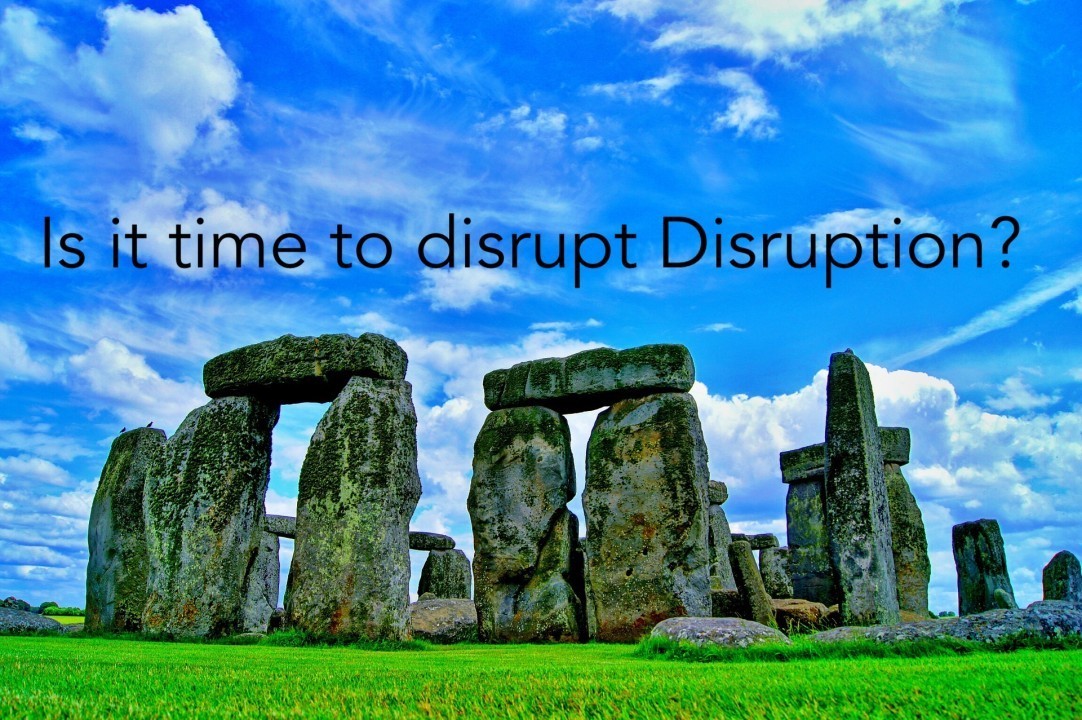Dealing with the cult goblins in organisations
Synopsis
Organisations appear to have a death wish, pursuing fads and cults which destroy their evolutionary potential. For example they take a simple word like disruption, capitalise it, and turn Disruption into a faith based movement, paradoxically destroying energy and creativity.
Two thousand years ago Lucretius declared that life tends to travel on a straight path with the occasional and random swerve and a new pathway. Thus emphasising the universal reality of evolution.
This short article argues that the modern term disruption is in fact nothing but a Lucretian swerve on the much broader and universal evolutionary curve. It is not and never can be, an end in itself.
Further organisations are warned of the anti-evolutionary dangers of fad and cult-like behaviour. Long-term and superlinear success is based firmly on the application of naturally occurring evolutionary principles to create beautiful and profitable organisations.
For those of you a tad suspicious of the fads and fallacies which seep suspiciously into your organisation, here are some practical suggestions to recognise these goblins before they do too much damage.
Generally cults start with an old idea wrapped up in a common word. Good examples include agile, lean in, mindfulness, emotional intelligence, resilience, managers vs leaders, and the inevitable mind-numbing, values. You will recognise plenty more from your own experience.
Before the goblins hijacked these words, no harm was done. This is what they do. They create a fake concept and attach it to a common word, capitalise it, start a movement with a selection of weird and wonderful rules and faith based rituals, and in no time at all you have a new cult.
The beauty of cults of course is that they control how people think and behave. Harmless 'agile' becomes 'Agile!' with a whole new vocabulary masquerading as the dawn of a new disrupted era. With the aid of some basic Pavlovian punishment and reward techniques the employees are washed in the river of goblindom only to emerge praising the new saviour, marching with zombie-like obedience.
Before the goblins hijacked these words, no harm was done. This is what they do. They create a fake concept and attach it to the word, capitalise it, start a movement with a selection of weird and wonderful rules and faith based rituals, and in no time at all you have a new cult.
And cults spread rapidly. August journals such as HBR quickly jump on board and in no time at all the High Priests of Agility declare that salvation is only through their new pathway. You just need to believe. You must have faith.
Much of this obvious madness begins with the relatively new found religion of Disruption.
Disrupt or die! This is just plain silly and here is why.
As far as we know our universe has been around for 14,000,000,000 years. (14 Billion). Our planet for about 4,600,000,000 years. (4,6 Billion). Modern era, writing, farming and religion 5,000 years. Modern organisational mankind 200 years.
To the best of our knowledge our particular universe has ticked along quite nicely since inception without any obvious celestial interference with one basic ingredient and one basic process. Energy and evolution. Yet despite this, organisations simply ignore this reality and lurch along from one experimental fad to the next.
Here are some important facts. (Geoffrey West, Scale). Every organisation is on a half life scale of just ten years. This means that of 100 new companies only three will survive fifty years. Those that die, blindly follow a sublinear strategy. Those that survive learn the evolutionary magic of the superlinear strategy.
The implications are severe. Disruption does not guarantee superlinearity. It offers the possibility of a new direction but not evolution.
Let's take Uber for example, the much lauded 'disruption' model. If we take a short term view then of course the Uber model is a disruption. But if we stand back we can see that it is the natural consequence of a much broader and continuous evolutionary process to the dawn of the internet and the technology before it. The internet simply created a new landscape of evolutionary possibility for things such as smartphones, dating sites, Facebook, fake news, and Russian trolls.
Apparent disruptions are not the result of some momentary genius. Rather they are the natural consequence of a universal and continuous evolutionary process.
Lucretius (see below) identified disruption two thousand years ago as the inevitable and random swerves on the infinite and naturally occurring evolutionary curve.
Not convinced yet? Let me inveigle the aid of Lucretius once more, the Roman philosopher who penned On The Nature of Things over two thousand years ago, in which he declared that life is a continuous steady pathway, occasionally impregnated with a random swerve and a new direction. Without knowing it he described perfectly the universal law of evolution. (Repetition, variation and selection.) And where each swerve represents a disruption.
This is what I am positing. Organisations, even though they have only been around for a blink of an eye (and may not be around for a further blink) are governed precisely by the evolutionary laws of the universe that have stood the test of 14 Billion years. And it does not help for us to think we can manage organisations with linear and non-evolutionary random fads and cults. The proof of the pudding is in the eating.
Let's take Uber for example, the much lauded 'disruption' model. If we take a short term view then of course the Uber model is a disruption. But if we stand back we can see that it is the natural consequence of a much broader and continuous evolutionary process to the dawn of the internet and the technology beyond. The internet simply created a new landscape of evolutionary possibility from smartphones to Facebook, Twitter and the rest.
Organisations are on a half life scale of ten years. That is not fake news. Organisations used to survive for fifty years or more. Now they are struggling to make fifteen. And the fundamental reason is becoming increasingly obvious (to me at any rate). Evolution drives the natural order of things, including leaders, teams and organisations.
In error we have developed non-evolutionary organisational development models which specifically avoid and destroy the natural order of things. (Evidence? Most people are stressed at work, dislike their work and bosses - all of which destroy the natural and necessary process of continuous innovation and creativity, the core genes of evolution.)
Just as social media has a dark strategy of hacking humans through applying Pavlovian techniques to convert us into salivating dogs, we need to tread very carefully that our organisations do not fall into the same trap.
In error we have developed non-evolutionary organisational development models which specifically avoid and destroy the natural order of things. (Evidence? Most people are stressed at work, dislike their work and bosses - all of which destroy the natural and necessary process of continuous innovation and creativity, the core genes of evolution.)
The universe is a complex, unknown and beautiful place. Let's use the evolutionary lessons of nature and apply them to make beautiful, creative, healthy and happy organisations, that place humanity at the centre of our long term and deeper purpose.
If you so much as smell a whiff of cultism in your organisation, raise your activist flag.
Comments
By accepting you will be accessing a service provided by a third-party external to https://quanta.consulting/


